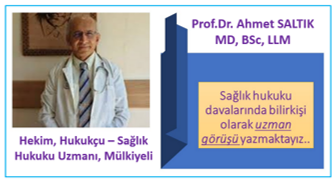Dostlar,
Em. Org. Çetin Doğan paşamız maalesef Balyoz Davası’nda 20 yıl hapis cezası aldı.
Damadı, Harvard’da İktisat (Ekonomi) Profesörü Dani Rodrik, kararın açıklandığını izleyen gün (22.9.12)
ABD’nin en önemli gazetelerinden biri olan The Washington Post‘ta konuya ilişkin dramatik bir makale yayımladı.
Yazının başlığı da çok çarpıcı : Turkey’s miscarriage of justice
Türkiye’de Adaletin Ölümü / Sonu.. diye Türkçeleştirebiliriz.
“Miscarriage” sözcüğü tıpta “düşük”, “gebeliğin düşükle sonlanması” anlamındadır.
Dolayısıyla, büyük umutlarla bebek bekleyen aile, bu muradına eremeden, gebelik ürünü düşmekte, telef olmakta, ölmekte ve büyük umutlar boşa çıkmaktadır.. Böylesi bir etimolojik kökeni ve anlam yükü vardır. Hüsrandır, acıdır, elemdir, düş kırıklığıdır… derinlemesine duyumsananlar..
Usta ve duyarlı kalemi için, sorunu dünya kamuoyuna taşıdığı için Prof. Rodrik kardeşimize (damadımıza!) teşekkür ederiz.
Sahi; AB’nin – ABD’nin insan hakları ve demokrasi kurumları ve şampiyonları neredeler?
Yerin dibindeler mi??
Sevgi ve saygı ile.
24.9.12, Ankara
Dr. Ahmet Saltık
www.ahmetsaltik.net
========================================================================
Prof. Dani Rodrik
Turkey’s miscarriage of justice
By Dani Rodrik, Published: FRIDAY, SEPTEMBER 21, 7:32 PM ET
After a patently sham trial, a Turkish court on Friday handed down lengthy jail sentences to more than 300 military officers convicted of planning a coup, code-named Sledgehammer, in 2003.
Turkey’s courts have been working overtime to throw government opponents of all political stripes behind bars. Since 2007, the government has run a series of trials against an alleged ultra-nationalist terrorist organization called Ergenekon, charging lawyers, politicians, academics, journalists and military officers with plotting to overthrow the government. In separate cases, thousands of Kurdish politicians and activists are on trial — nearly 1,000 among them detained — for alleged links with terrorist activities. Turkey holds more journalists in jail than China and Iran combined.
In terms of sheer drama, few match the Sledgehammer case. In a trial that began in 2010, 365 serving and retired high-ranking military officials — including my father-in-law, Çetin Dogan — and two civilians are charged with planning the coup. Prosecutors allege that the plotters planned to bomb mosques, down a Turkish fighter jet in a false-flag operation, take over hospitals and pharmacies, close nongovernmental organizations, arrest journalists and politicians, and ultimately appoint a handpicked cabinet.
Yet the “incriminating documents” the court relied on to issue Thursday’s verdict were forged and have been used to frame the defendants. American, German and Turkish forensic analysts hired by the defense have independently confirmed the forgery.
The prosecution asserted that the coup was planned in 2003, citing unsigned documents on compact discs it claims were produced by the defendants at the time. However, even though the last-saved dates on these documents appear as 2002-2003, they were found to contain references to fonts and other attributes that were first introduced with Microsoft Office 2007. Hence the documents could not have been created before mid-2006, when the software was released. The handwriting on the CDs was similarly found to be forged. In addition, many defendants have proved that they were outside Turkey or hundreds of miles away from work at the time they are alleged to have prepared these documents or attended coup-planning meetings. The documents also contain countless anachronisms, such as names of organizations and places that didn’t yet exist in 2003 or were changed after that time.
All this evidence leaves room for only one conclusion:
The alleged coup plot is fabricated.
This conclusion has long been obvious to the Turkish military. In response to the mass arrest of their colleagues, the chief of Turkey’s armed forces and the heads of Turkey’s army, navy and air force resigned together on one symbolic day last summer. The case is widely seen as the means by which Prime Minister Recep Tayyip Erdogan has decapitated the military, a powerful institution that has long opposed Islamist forces in Turkish society.
Most alarming is the Turkish court’s evident complicity with the forgery. In violation of both Turkish and international law, the court rejected all defense requests for independent authentication of the evidence, ignoring the numerous anachronisms and other indications of forgery. It refused to allow the defense to call key witnesses, including the former commander of the land forces whom the prosecution credited with preventing the coup even though he has publicly denied any knowledge of it. It violated attorney-client confidentiality by installing microphones on courtroom ceilings. Of the 365 defendants, 250 were held in prison; most have been jailed since the trial started 20 months ago.
Beyond preventing defendants from establishing their innocence, the judges have lodged criminal complaints against defendants and their lawyers for statements they made during trial that the judges disliked, leading to additional indictments against several. The wives of two defendants have been indicted for a peaceful demonstration outside the prison compound where the trial has been held. And the Turkish government has publicly acknowledged its real motives by forcing 34 defendants to retire from the military before the judges reached a verdict.
Outraged at these abuses, family members of the defendants have filed a petition with the U.N. Working Group on Arbitrary Detention, seeking a declaration that the 250 imprisoned defendants have been detained in violation of international law. Given the weight of the evidence, I believe the working group, composed of experts in international law, will conclude that the defendants have been detained illegally and will call for their release. As redress doesn’t seem possible in Turkey, the working group could provide the independent and impartial review that is urgently needed.
I hope that the world will more closely focus on the gross miscarriage of justice taking place in Turkey. While Turkey touts itself as a leader of democratic freedoms in the Middle East, its actions in this and similar cases indicate otherwise. Let us hope that shining a light on these flagrant manipulations will hasten the day that the rule of law becomes more firmly established in Turkey.
http://m.washingtonpost.com/opinions/turkeys-miscarriage-of-justice/2012/09/21/e2125276-033d-11e2-8102-ebee9c66e190_story.html




